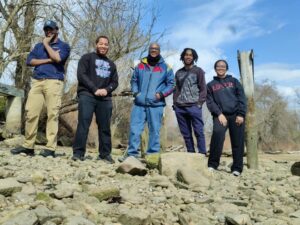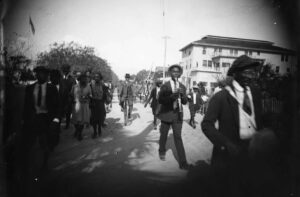Third-year students Nafisa Bangura (left) and Angelica Dadda (right) are part of an undergraduate-led research team exploring the efficacy of CoolSeal, a pavement coating designed to reduce surface and air temperatures in urban areas exposed to extreme heat. Over the summer, the duo expanded this work by participating in a Penn Undergraduate Research Mentoring Program project.
In fall 2024, a team of undergraduates in the Composto Soft Matter Laboratory (Composto Lab) launched a cross-disciplinary project testing the efficacy of a pavement coating designed to reduce surface temperatures in neighborhoods affected by extreme heat. Nafisa Bangura and Angelica Dadda, both third-years in the School of Engineering and Applied Science (SEAS), took the lead this summer as part of the Penn Undergraduate Research Mentoring Program (PURM).
The CoolSeal project—kickstarted by a grant from Penn’s Environmental Innovation Initiative to Russell Composto, professor of materials science and engineering in SEAS and Penn’s vice provost for undergraduate education, and Kristin Field, director of education at The Internet of Things for Precision Agriculture—involves collaborators from SEAS, the City of Philadelphia’s Office of Sustainability, and the Weitzman School of Design. Pioneered by third-year Julia Chiang and fourth-year Colby Snyder, this project to help address urban heating aligns with Penn’s strategic framework In Principle and Practice by promoting multidisciplinary pursuits, supporting local communities, and leading on pivotal climate-related challenges.
“This is a great opportunity to connect our students to a real-world problem around urban heat mitigation—and it’s also cool science,” says Composto, who served as PURM faculty mentor for the CoolSeal project.
PURM, administered by the Center for Undergraduate Research & Fellowships, provides students finishing their first or second year at Penn with a 10-week summer research experience under the mentorship of a faculty member. Bangura and Dadda, along with fellow third-year and PURM participant Dylan York, spent the summer examining the performance of CoolSeal by GuardTop at Hunting Park, a neighborhood in North Philadelphia exposed to excessive heat.
Evaluating CoolSeal for heat mitigation
Over three site visits, the trio collected data on surface and air temperatures—as well as supplementary measurements of wind and humidity—in relation to CoolSeal-treated and untreated asphalt. Zhan Shi, a graduate student at the Thermal Architecture Lab, led by assistant professor of architecture Dorit Aviv, mentored the undergraduate students throughout the summer, and helped them with measurement protocol and data collection to ensure scientific rigor and integrity. During each visit, the students recorded data between 9-10 a.m., noon-1 p.m., and 4-5 p.m. The PURM team found that CoolSeal lowers the surface temperatures of asphalt in Hunting Park.
“Throughout the summer, we observed a difference between CoolSeal and [uncoated] asphalt of about 9.2 degrees Fahrenheit,” says Bangura, a materials science and engineering (MSE) major in SEAS from Lawrenceville, Georgia. This finding verifies a similar CoolSeal study at Arizona State University (ASU) in Phoenix, and other schools, but was the first demonstration of CoolSeal’s effectiveness in a humid climate.





